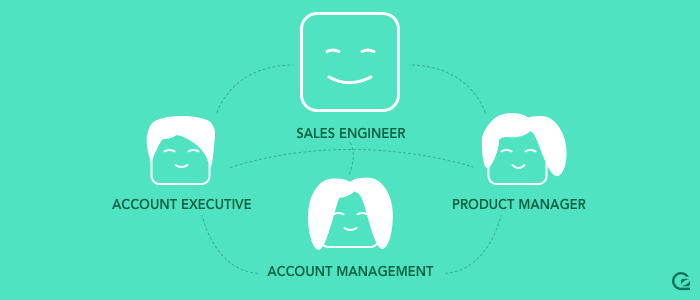
The minimal upfront costs, ease-of-setup and scalability create a low risk approach to trying out most software as a service (SaaS) platforms.
However, having people sign up for your platform and having your platform successfully integrated into a customer’s environment are two very different things.
In B2B sales, a successful integration can be the key factor in determining if a trial signup converts or cancels.
Sales engineers are the link in your sales process, establishing the technical requirements needed to integrate your SaaS platform into a user’s environment. They can establish what is technically feasible beyond the out-of-the-box functionality, but, perhaps most importantly, they communicate the optimal way of using your solution based on a customer’s existing setup.
True integration goes beyond just technical integration, it’s about understanding the value your platform can offer a specific customer and ensuring it’s constantly delivered within their existing setup.
What does a sales engineer do?
Simply put, sales engineers sell customer success.
It’s fair to make the assumption that there will be common pain points that your platform can address for most users, but often each user’s setup will unique. They’ll have different technology stacks, different software portfolios, and different workflows.
A sales engineer must have a deep technical understanding of your SaaS platform to ensure a seamless integration into the customer’s system. This way the solution you deliver will go above and beyond its intended purpose, addressing pain points, whilst complementing the client’s existing setup. You’ll start to see true success with your customers, delivering bespoke solutions without doing so at a technical cost.
Basic overview of the role
A sales engineer becomes involved from the very early stages of the sales process.
In general, they the key responsibilities include:
- Scripting and presenting demos.
- Addressing initial technical objections or questions a potential user may have.
- Assisting external developers with initial technical integrations.
- Researching and implementing required third party integrations.
- Explaining and communicating technical documentation.
- Providing front-line technical feedback to your internal development team.
What metrics should a sales engineer focus on?

It’s easy to get overwhelmed when deciding what startup metrics to focus on. As with any member of a startup team, it makes sense to measure the effectiveness of their role based around their key activities.
A good indicator of their level of activity is the number of demos they are undertaking each week. Demos are a critical event for them to be involved in and as such are a straightforward metric to measure.
As with any sales function, it’s important to quantify the sales engineer’s impact on sales overall, but another metric that should be taken into account is retention. If customers are set up optimally to use your platform and you’re delivering real value, a sales engineer should have a demonstrable impact on retention, and may even enable accounts to grow over time.
What is an average day in the life of a sales engineer?

It’s fair to say that there really isn’t an average day. The role can involve undertaking product demos, getting immersed in technical third party documentation, helping develop proof of concepts, getting a working knowledge of new programming languages, hosting webinars, going to technical meetups. No two days are ever the same!
Why should a SaaS business invest in sales engineers?

From Google to Salesforce to HubSpot, you’ll find it hard to find a leader in the SaaS world that doesn’t employ or value the role of sales engineers.
Even at an early stage as a startup, as you focus on ramping up your MRR, a sales engineer will not only assist with integrating and converting new trial users, but also will help feed back issues and product improvements to the product team.
How we’ve benefitted from the sales engineer role
An example of where we’ve benefited from having a sales engineer was in our recent work with a large US e-retailer. By starting a conversation with their technical team, our sales engineer was able to identify a real pain point they had – their inability to run targeted email campaigns due to the limitations of their enterprise email software provider.
By working with the external email provider’s developers to get access to their API documentation, we could then work with the client’s developers to put together a proof of concept. It showed how GoSquared could be used to power all the logic needed to create personalised email lists based on user behaviour and then pass that information on to the email software to deliver the campaigns.
With the groundwork done, the client’s developer was able to set up an integration between GoSquared and their email provider, which allowed them to trigger targeted email campaigns based on GoSquared People. It delivered huge value to their marketing team and reduced the ad-hoc requests their technical team had to undertake.
As a sales opportunity, this deal required the technical capacity of an engineer, combined with the persistence and customer communication you’d expect from an account executive. For us, it proved the role of a sales engineer can deliver significant revenue.
How to ensure you succeed with sales engineers on your team

It’s important to set expectations and clearly define the metrics to secure the sales engineers’ success. Their role must also be clearly defined.
As sales processes have the tendency to be quite fluid, it’s easy for anyone on the team to get caught up in areas either side of the intended responsibility. So establishing and assigning responsibilities within the sales process accordingly is vital to ensuring every sales engineer is spending their time effectively.
Finally, you want to make sure they have all the tools they need at their disposal. The sales engineer role is a constant source of learning and attracts people with that level of appetite for education – you need to provide them with the tools to test, trial, and implement their ideas.
Final thoughts
With any team, it’s always beneficial to have team members who approach problems from different angles.
A sales engineer’s skill set brings another dimension to problem solving internally. A role with the commercial focus and responsibility of a sales person, combined with the mindset and problem solving approach of an engineer, can not only have a positive impact on your clients, but also a big impact on the culture of your sales team.

